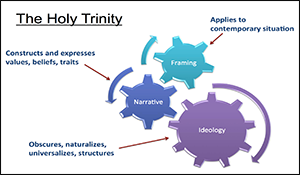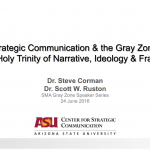Strategic Communication and the Gray Zone

Strategic Communication and the Gray Zone: The Holy Trinity of Narrative, Ideology and Framing.
Speaker: Ruston, S. (Arizona State).
Abstract
Date: June 2016.
Arizona State University’s Center for Strategic Communication conducts research on strategic communication challenges in the public sector, and has a long history of contribution to USG and DOD efforts in understanding narratives (especially extremist narratives), countering violent extremist ideology, and uniting humanities and social science analytic methods with computational capabilities to enhance speed and scale of analysis. This presentation discusses the “holy trinity” of strategic communication in gray zone conflicts—narrative, framing and ideology. Narrative creates scenarios that explain how events did unfold or should unfold. Framing guides interpretations to align facts with narratives. Narrative and framing accomplish ideological functions of naturalizing, obscuring, universalizing, and structuring. In addition to explaining these concepts we discuss the need for a model that predicts whether related messages are likely to gain traction with target audiences.
Dr. Scott Ruston (Ph.D., University of Southern California) is an Assistant Research Professor in the Center for Strategic Communication at Arizona State University where he specializes in narrative and media studies. He has applied this expertise in a variety of strategic communication research contexts, including new methods and tools for analysis of extremist narratives; strategies for counter or alternative narratives; and the neurobiology of narrative comprehension. He is co-author of “Mediated Martyrs of the Arab Spring” exploring narrative in new media contexts, and Narrative Landmines: Rumors, Islamist Extremism and the Struggle for Strategic Influence which examines rumors as narrative phenomena. In addition, Dr. Ruston is a 24-year veteran of active and reserve service in the US Navy, having deployed to Combined Joint Task Force Horn of Africa as the J39 and Deputy Director for Theater Security Cooperation, as well as past support through NATO ACT of the Multi-National Information Operations Experiment (MNIOE). Dr. Ruston brings this experience to the study of real world problems of strategic communication in public diplomacy and defense contexts.

Comments